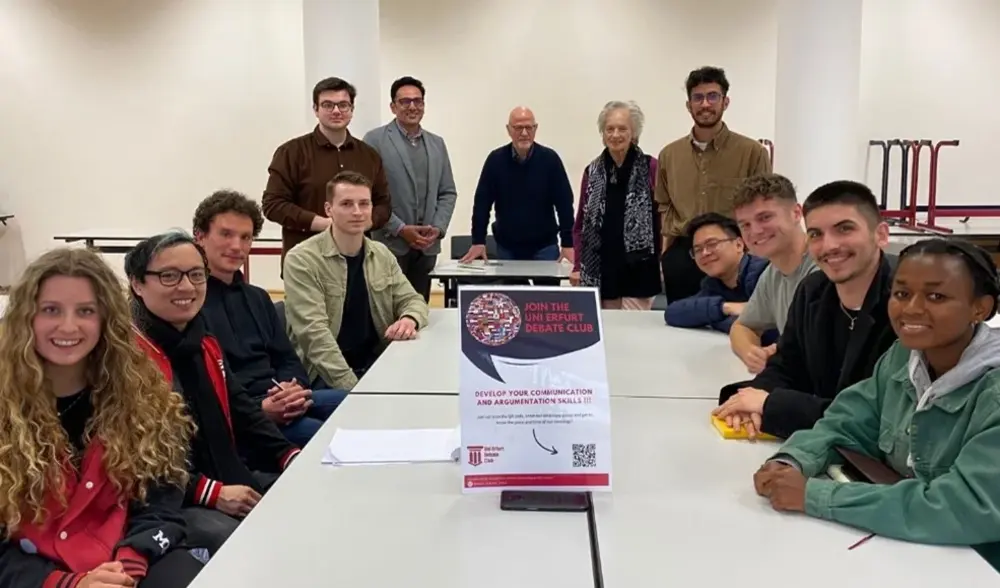The Great Debate Challenge: Testing the Creative Edge of Humans Against AI

This month, students from the Uni Erfurt Debate Club argued for and against the development of Artificial Intelligence (AI). They explored the main arguments and ethical barriers of a technology that has exploded in popularity and rapidly gained ground in the last few months. The Uni Erfurt Debate Club, a joint initiative led by students from Willy Brandt School, International Relations, Economics, Law, and Social Sciences, decided to make it not only a debate session but also a social experiment, comparing AI generated arguments against human arguments.
The idea came a couple of months after ChatGPT took off and became a trend. With AI already capable of creating visual arts, music, various kinds of texts, and even deepfake videos, it was inevitable to bring up this issue and delve deep into this discussion. The matter has gained even greater relevance after a group of scholars and big tech executives, including Elon Musk and Apple co-founder Steve Wozniak, signed an open letter calling for a pause in AI development due to profound risks to society and humanity.
The Social Experiment
Students from six different countries and a variety of backgrounds, mostly focused on international relations, public policy, and global communication, were challenged to use ChatGPT and create arguments on the following motion:
"Should we stop the development of AI?"
The debate topic was announced in advance, and the goal was to compare the arguments from ChatGPT and the students and see if humans would be capable of creating arguments that ChatGPT did not mention. To do that, a committee, including Uni Erfurt language coaches Barbara Kuntze and Timothy Bell, was set up to assess debaters' performance, content, and logic.
Establishing the Setting: AI's Potential and Cultural Influence
Our guest of honor was Dr. Hasnain Bokhari, from the Willy Brandt School who specializes in Digitalization and Internet Politics. In his keynote speech, he set the scene and highlighted how AI has been portrayed in mainstream media, citing movies such as "I, Robot" and Steven Spielberg's films "Artificial Intelligence" and "Minority Report."
He also drew attention to the fact that AI is not exactly a novelty; it has been around as chatbots, spell-checker systems or automated decision-making systems. They have played an important role in predictive analysis and the ground-breaking impacts of machine learning in different sectors are yet to be seen.
Arguments
As expected, it was not possible to determine a winner between humans and AI; both argued in different ways. Out of the arguments listed using ChatGPT, 62% were mentioned by students. However, the debaters created 10 arguments that the Chatbot did not produce. Four main points stood out from the whole discussion: fake news, sustainability, economic growth, and unemployment.
The impact of AI on the spread of fake news was a pivotal point in the discussion. While AI defenders argued that it could help humans to identify relevant sources and potential misinformation, the opposition pointed out that it is already hard to differentiate what is real or created by AI. The image of the Pope wearing a coat that went viral in March this year or deep fake videos of politicians are good examples of that phenomenon. That could put democracies in danger.
The sustainability of AI systems also sparked controversy. AI improves human capacity to managing data, which pushes up the demand for data centers that have a high carbon footprint. However, it can also be used to optimize transportation systems and help design more sustainable and efficient cities.
The economic debate was also intense. The side in favor of AI development emphasized the economic development aspect: cost reduction for small businesses, the emergence of new industries, and the creation of new job opportunities. In contrast, mass unemployment was explored as a counterargument and a primary concern regarding the economic and social risks associated with developing the technology. The potential of AI to increase inequality and the profound impact that unemployment would have on more vulnerable economies in the Global South was a notable difference between the arguments of humans and ChatGPT.
Lessons Learned
The human capacity for communication went way beyond a summarized list of arguments created by ChatGPT. Debaters were capable of delivering speeches in a more persuasive and appealing manner. They brought passion to the communication process and enhanced the acceptance of an argument by connecting with the audience which was demonstrated as a very unique feature of human reasoning.
Despite ChatGPT constructing some good arguments, students were more successful in addressing more abstract arguments, such as the influence of AI, fake news, and social media on the public space debate, or recognizing AI's biases and its different economic and political impacts among countries. Conversely, ChatGPT explored a wider range of areas to be affected by the technology: cybersecurity, innovation, scientific research, and warfare.
The whole experiment showed that those who more thoroughly explored the AI tool had better performance. However, technology does not do anything alone; the ability to create prompts, to explore issues, learn from them, and connect to the human experience seems to be the real valuable human skill in the AI era.
About the Author

Roman Bertoldo Coutinho, Brazilian, Bachelor of Public Management from the Federal University of Rio de Janeiro, he worked for two years for the Brazilian Institute of Geography and Statistics and two years with technical assistance for recycling cooperatives. At the Willy Brandt School, he is specializing in Social Economic Development and Global Public Policies.
~ The views represented in this blog post do not necessarily represent those of the Brandt School. ~